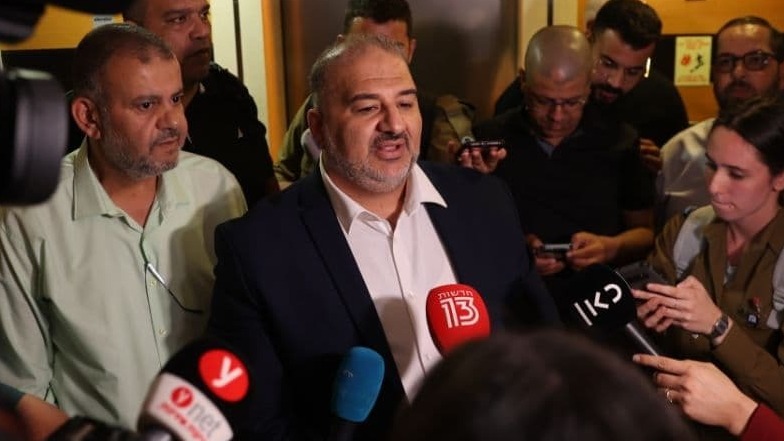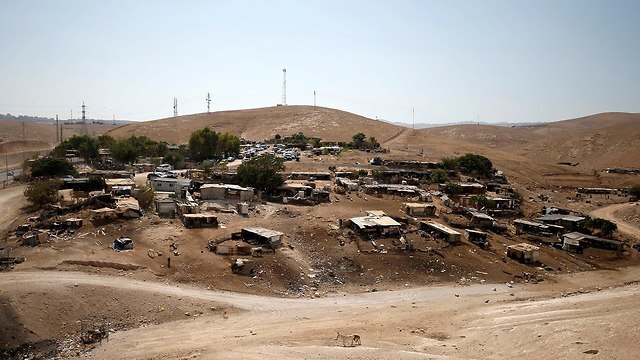Members of Israel’s new government, slated to be sworn in and assume control of parliament on June 13, has continued to finalize the numerous and complex agreements and contracts behind the patchwork, intricate coalition.
One of the most consequential and controversial deals remains the one reached between the Ra’am-United Arab List and the rest of the member parties. It was the final agreement struck last week, in general outlines, with just minutes remaining before the deadline to form a government expired.
4 View gallery


Mansour Abbas speaks to reporters after signing the coalition agreement with Yair Lapid and Naftali Bennett last week
(Photo: Moti Kimchi)
It means Israel’s 36th government will be the first to incorporate a fully independent, all-Arab party in its ranks.
The coalition agreement, signed between Ra’am chair Mansour Abbas, Prime Minister-designate Naftali Bennett and Yair Lapid, the Yesh Atid leader who will become PM in two years’ time, stipulates a series of policy changes and vast budgetary investments in the Arab and Bedouin societies in Israel.
Among the various government projects detailed in the pact, over $15 billion is pledged to infrastructure, education and initiatives to reduce crime.
Israel will also immediately recognize three unauthorized Bedouin villages in the southern Negev desert, extend by three years the freeze already placed by the outgoing government on the demolition of illegal housing in the Arab community, and present within nine months a proposal to legalize all unlawful Bedouin villages.
“Abbas promised his voters, who come mostly from the Negev, to make their problems his top priority, and he has. The question now is whether he’ll succeed in actually following through with it,” says Dr. Thabet Abu Rass, co-executive director of The Abraham Initiatives organization.
“Recognizing these unauthorized villages is a long process, governments in the past have tried to deal with it. They’ve come and gone but this has remained an issue. It’s a very powerful apparatus that operates extremely slowly,” he says.
“This time, symbolic declarations simply won’t do. Bedouins want a legislative package that will transform their lives in the desert,” Abu Rass said.
The historic agreement between the far-right Bennett and the United Arab List caught many by surprise, after the soon-to-be premier referred to Abbas and his colleagues as “terrorism sympathizers” and “supporters of murderers” only two months ago.
“I’ve found a brave leader in Abbas,” Bennett admitted after securing the latter’s support last week.
4 View gallery


L-R: Yesh Atid chair Yair Lapid, Yamina leader Naftali Bennett and Ra'am head Mansour Abbas signing a coalition agreement last week
(Photo: Nawaf al-Nabari)
Following Bennett and Lapid’s announcement that they had succeeded in forming a government, Prime Minister Binyamin Netanyahu blasted the reported deal, accusing his rivals of “selling out southern Israel to the highest bidder” and “endangering Israeli citizens and surrendering our sovereignty.”
“Bennett has sold the Negev to Ra’am,” says a spokesperson for Netanyahu’s Likud party. “Any right-wing Knesset members, elected by right-wing votes, must oppose this dangerous leftist government.”
Yet, it was Netanyahu himself who for weeks following the elections courted Abbas with identical proposals, desperately trying to piece together a coalition based on the Arab lawmaker and the far-right parties in his own base.
4 View gallery


Mansour Abbas meeting with former Druze minister and Netanyahu ally Ayoob Kara days after the March 2021 elections
Abu Rass says that Ra’am voters “wanted the party to help remove Netanyahu from power, of course, but not enter [Bennett’s] government themselves. There’s a big difference.”
He claims Abbas’ cooperation with the intended prime minister should have resembled the 1992 Rabin-led model, when predominantly Arab parties voted with the government from the opposition benches to help pass the Oslo Accords.
Another point of contention among the party’s voters is the fact that the landmark agreement fails to mention any resolutions regarding religious, national and Palestinian matters.
Raa’m is also bound, according to the document’s text, to support any government resolution.
“So, what happens during the next round of fighting in Gaza? They have to support it, despite their constituents’ obvious opposition to such things,” Abu Rass says.
Still, if the promises laid out in the pact are indeed fulfilled, Abbas’ feat will be unprecedented.
“And if he doesn’t have any achievements to show by the time this government is dispersed, which I believe will be in about a year, he won’t be reelected, and will have to step aside as party leader,” Abu Rass says.
“The Islamic movement will survive regardless, and even thrive. This party has a strong base, it has tradition, infrastructure, voters,” he says.
“Israel’s Arab society today refuses to accept just funds and budgets, it demands political participation and legitimization as well. It’s a win-win situation, for the Arab minority and the state. It’s an irreversible and positive trend.”


